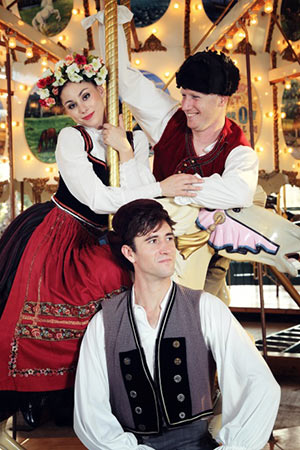MAW Presents ‘The Bartered Bride’
Opera Brings Lovers, Liars, and Clowns to the Stage

Opera can sometimes sneak up on you. Granted, that’s an odd thing to say about an art form best known for high-decibel emoting. But longtime fans know it’s true. “A lot of the best operas take the risk of seeming silly, and then they reveal a deep wellspring of emotion,” noted composer and conductor Matthew Aucoin. “Mozart’s Così fan tutti does that. So does Stravinsky’s The Rake’s Progress and Verdi’s Falstaff. At the beginning, you think, ‘This is going to be a jolly evening,’ but then you get choked up unexpectedly.”
This weekend, Aucoin is conducting another opera that fits that description: The Bartered Bride by Bedřich Smetana, the Czech composer best known for his orchestral work The Moldau. The Music Academy of the West will present this gentle comedy in an English-language translation Friday, July 29, and Sunday, July 31, at the Granada Theatre.
Set in rural 19th-century Bohemia and populated by stock characters, it casts a charming spell for its first two acts. There are ardent young lovers, greedy parents, a cynical marriage broker, and even a charming dimwit.
But in the final act, the actual emotional stakes for the central characters suddenly become real, and instead of smirking at their faraway world, we find ourselves swept into it. “The only real aria in the piece happens towards the end of the third act,” said director David Paul, who is staging the Music Academy of the West production. “That’s the heart and soul of the opera.”
Most classical music lovers know the work’s overture as well as several of its dances, which are regularly programmed on orchestral concerts. But the work as a whole is rarely staged in the U.S. — which is somewhat puzzling, since it is in many ways an old-fashioned audience-pleaser. “It’s absolutely tonal and full of melodies,” said Paul. “Its feel is familiar yet unique.”
“Every single minute of the piece is a Czech folk-dance rhythm,” Aucoin added. “If you play it politely, it will sound terrible! I think the challenge [for a conductor] is to get people in touch with their inner folk musician — to play in a more gutsy, rhythmically satisfying way.”
The story concerns a young woman who chafes at her parents’ plans for her — an arranged marriage to the son of a wealthy family — and the young man who loves her. Amid a colorful backdrop, including a traveling circus, he comes up with a clever scheme to make her his bride. “It’s a celebration of a pastoral, pre-urban world,” Paul said. “A lot of people spend time together spontaneously in the town square, singing and dancing and drinking and having a good time.
“We are setting it in the 1880s, a little bit later than the original setting,” he added. “We’re shooting for a real contrast between the generations (in terms of dress), with a looser, more open feel for the younger characters and a more bundled-up feel for the older ones. My approach is to try to weave that story of the generational divide into every part of the piece, including the comic scenes and the dances. I’m hoping it’ll be naturalistic and a little bit fantastical. There will be a clown or acrobat element to the circus. It’s a grand spectacle of sorts — a show within a show.”
Paul explained that there are three fairly elaborate dances in the piece, including the circus performance. “There’s also a village dance, which is a polka, and one of the guys letting loose in a beer tavern. Dancers from State Street Ballet will be the leaders in those scenes. They play different characters, but they’re very much a part of the fabric of this town. “I love using dance as a way to heighten the moment while you continue to tell the story,” he said. “That’s fun and refreshing for the audience. It increases the electricity in the room.”
Paul directed several Music Academy productions in recent years, including Carmen and another relative rarity, The Rake’s Progress. This is the lightest of the bunch, but the audience shouldn’t expect slapstick. “I want it to be a piece that leaves people feeling good,” he said. “It’s not so much a laugh-out-loud comedy as it is a smile-as-your-brain-is-tickled comedy.”
4∙1∙1
The Music Academy of the West presents The Bartered Bride Friday, July 29, at 7:30 p.m. and Sunday, July 31, at 2:30 p.m. at the Granada Theatre (1214 State St.). Tickets are $40-$125. For more information, call (805) 969-8787 or see musicacademy.org.



